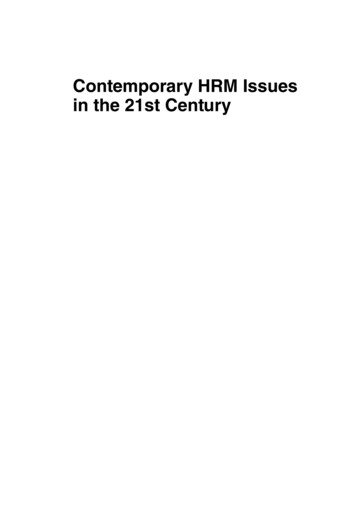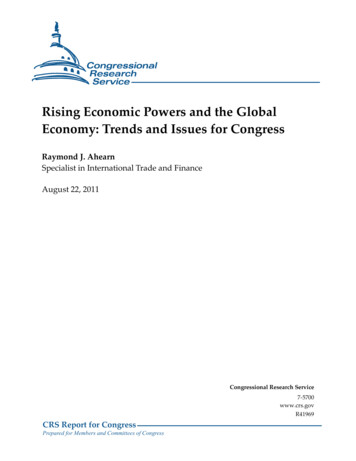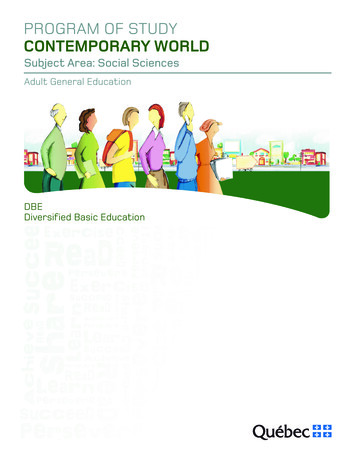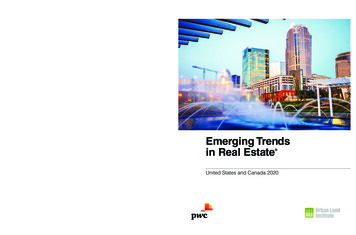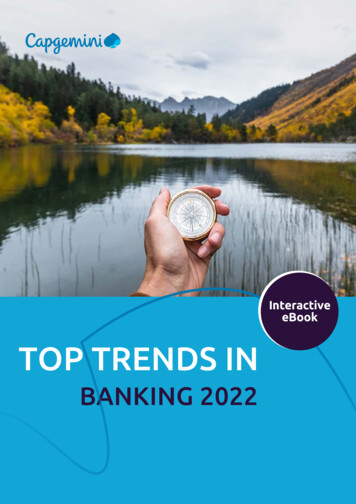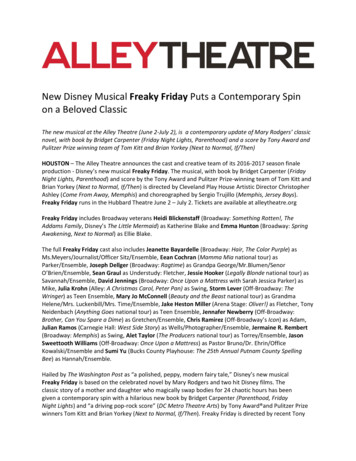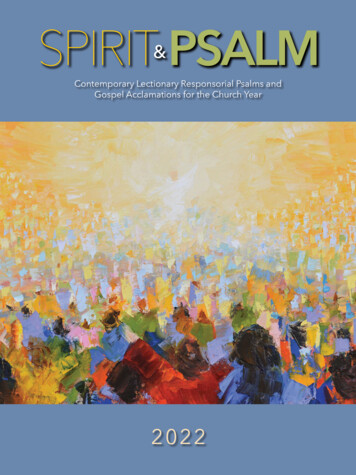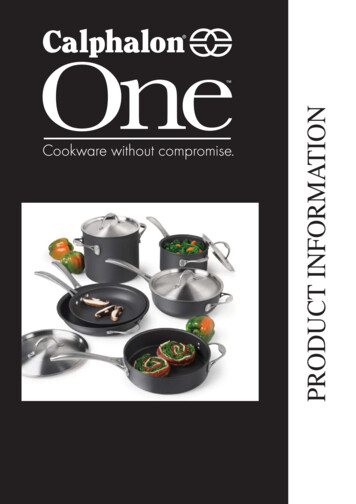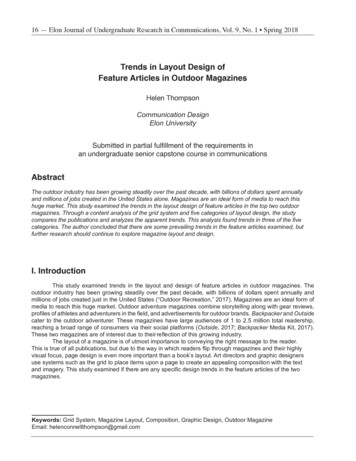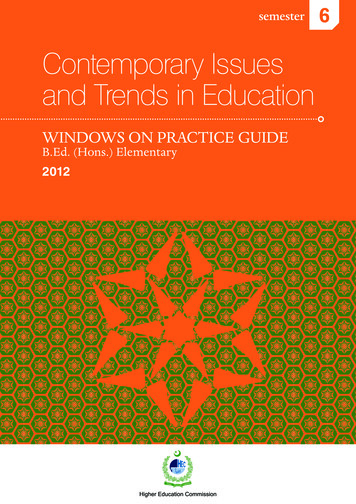
Transcription
semesterContemporary Issuesand Trends in EducationWINDOWS ON PRACTICE GUIDEB.Ed. (Hons.) Elementary20126
This product has been made possible by the support of the American People through the United States Agency forInternational Development (USAID). The contents of this report are the sole responsibility of the authors, and donot necessarily reflect the views of USAID or the United States Government.Technical Support: Education Development Center (EDC); Teachers College, Columbia University
ForewordTeacher education in Pakistan is leaping into the future. This updated Scheme of Studies is the latestmilestone in a journey that began in earnest in 2006 with the development of a National Curriculum,which was later augmented by the 2008 National Professional Standards for Teachers in Pakistan andthe 2010 Curriculum of Education Scheme of Studies. With these foundations in place, the HigherEducation Commission (HEC) and the USAID Teacher Education Project engaged faculty across thenation to develop detailed syllabi and course guides for the four-year B.Ed. (Hons) Elementary and thetwo-year Associate Degree in Education (ADE).The syllabi and course guides have been reviewed by the National Curriculum Review Committee(NCRC ) and the syllabi are approved as the updated Scheme of Studies for the ADE and B.Ed. (Hons)Elementary programmes.As an educator, I am especially inspired by the creativity and engagement of this updated Scheme ofStudies. It offers the potential for a seismic change in how we educate our teachers and ultimately ourcountry’s youngsters. Colleges and universities that use programmes like these provide their studentswith the universally valuable tools of critical thinking, hands-on learning, and collaborative study.I am grateful to all who have contributed to this exciting process; in particular the faculty and stafffrom universities, colleges, and provincial institutions who gave freely of their time and expertise forthe purpose of preparing teachers with the knowledge, skills, and dispositions required for nurturingstudents in elementary grades. Their contributions to improving the quality of basic education inPakistan are incalculable. I would also like to thank the distinguished NCRC members who helpedfurther enrich the curricula by their recommendations. The generous support received from theUnited States Agency for International Development (USAID) enabled HEC to draw on technicalassistance and subject-matter expertise of the scholars at Education Development Center, Inc., andTeachers College, Columbia University. Together, this partnership has produced a vitally importantresource for Pakistan.PROF. DR. SOHAIL NAQVIExecutive DirectorHigher Education CommissionIslamabadB.ED. (HONS) ELEMENTARYii
IntroductionAs part of nationwide reforms to improve the quality of teacher education, theHigher Education Commission (HEC), with technical assistance from the USAIDTeacher Education Project, engaged faculty across the nation to develop detailedsyllabi for courses in the new four-year B.Ed. (Hons) Elementary programme.The process of designing the syllabus for each course in years 3–4 of theprogramme began with a curriculum design workshop. Deans and directors fromuniversities where these courses will be taught identified faculty to attend theworkshop. The first workshop included national and international subject matterexperts who led participants in a seminar focused on a review and update of subject(content) knowledge. The remainder of this workshop was spent reviewing theHEC Scheme of Studies, organizing course content across the semester, developingdetailed unit descriptions, and preparing the course syllabi. Although the coursesyllabi are designed primarily for Student Teachers taking the course, they areuseful resources for teacher educators, too.Following the initial workshop, faculty participants developed teaching notes thatinclude ideas for teaching units of study and related resources. Working individuallyor in groups, participants focused on their teaching methods and strategies and howthey could be useful to future teachers of the course. Subsequent workshops wereheld over the course of a year to give faculty sufficient time to complete their work,engage in peer review, and receive critical feedback from national and internationalconsultants. In designing both the syllabi and the teaching notes, faculty and subjectmatter experts were guided by the National Professional Standards for Teachers inPakistan (2009).All of the syllabi developed by faculty who participated in the process are includedin this document, along with a list of topical teaching notes. Additional referencesand resources appear at the end of the document. These should provide a richresource for faculty who will teach the course in the future. This Windows onPractice guide is not intended to provide a complete curriculum with a standardsyllabus and fully developed units of study, but rather aims to suggest ideas andresources for Instructors to use in their own planning. Hence, readers will findsample units and materials that reflect the perspective of faculty designers ratherthan prescriptions for practice.iiiCOURSE GUIDE: Contemporary Issues and Trends in Education
We respect intellectual property rights and to the best of our knowledge, we havenot included any suggested materials that are copyright protected or for which wehave not secured explicit permission to use. Therefore, all materials included maybe used in classrooms for educational purposes. Materials in this document are notintended for commercial use, however. They may not be used in other publicationswithout securing permission for their use.Initial drafts were reviewed by the National Curriculum Review Committee(NCRC) and suggestions were incorporated into final drafts, which were thensubmitted to the NCRC for approval.Faculty involved in course design: Dr Asaf Niwaz, Hazara University, Haripur;Bashir Nasir, Shah Abdul Latif University, Khairpur; Intizar Hussain, University ofKarachi, Sindh; Mahvish Naseem, Fatima Jinnah Women University, Rawalpindi;Dr Naveed Sultana, Allama Iqbal Open University, Islamabad; Qadir Bux Laghari,Shah Abdul Latif University, Khairpur; Dr Muhammad Ramzan, KarakorumInternational University, Gilgit; Shehla Sheikh, Gomal University; and Shereen Taj,University of Balochistan, Quetta.International subject expert leading the seminar and design workshop: Dr AmeenaGhaffar-Kucher, Senior Lecturer, Graduate School of Education, University ofPennsylvania.Date of NCRC review process: 11–12 January 2013NCRC reviewers: Dr Ishtiaq Hussain, Institute of Education and Research,University of Science & Technology, Kohat; Dr Muhammad Ramzan, KarakorumInternational University, Gilgit; and Dr Saeed Khan, University of Haripur, KhyberPakhtunkhwa.B.ED. (HONS) ELEMENTARYiv
05COURSE GUIDE: Contemporary Issues and Trends in Education
Table of contents1 Rationalefor a course on contemporaryissues and trends in education.08 Common misconceptions aboutcontemporary issues in education. 092Course syllabi.10 Syllabus 1: Dr Naveed Sultana and.11Mahvish Naseem Syllabus 2: Dr Asaf Nawaz, Shehla Sheikh,.18and Dr Muhammad Ramzan Syllabus 3: Shereen Taj, Intizar Hussain,.25Qadir Bux Laghari, and Bashir Nasir3Integrated teaching notes.29Introduction to the course.30Activities: Options 1 and 2.30Notes for faculty.31Technology in education.33Activities: Options 1 and 2.33Notes for faculty and additional resources.34Gender disparity.34Activities: Options 1 and 2.34Notes for faculty and additional resources.35Quotations on gender equity.35Conflict resolution.36Activities: Options 1 and 2.36Notes for faculty.38B.ED. (HONS) ELEMENTARY06
Table of contents (cont.)Reading: What is conflict?.39Handout: Thinking about how to handle conflict.41Additional websites.42Peace education.43Activities: Options 1 and 2.43Notes and additional resources for faculty.44 Faculty resource: Quotations on andconcepts of peace education.44Reading: Giving peace a chance.46Ten steps for peace education.49Challenges in Pakistan’s schools.52Activities: Options 1 and 2.52Notes for faculty and additional resources.534 References.555 07Methods and strategies to use inteaching and learning during this course.59COURSE GUIDE: Contemporary Issues and Trends in Education
1Rationalefor a course oncontemporaryissues and trendsin educationB.ED. (HONS) ELEMENTARY08
In its 2010 document, Curriculum of Education: B.Ed. (Hons.) 4-Year Degree Programme,the HEC added Contemporary Issues and Trends in Education as a professional threecredit course. This flows from the belief that a broad-based knowledge approach tocontemporary issues and trends in education is crucial for teacher preparation.The main aim of the course is to provide Student Teachers with knowledge about andinsight into the pressing issues of today’s global community. In its curriculum guide,the HEC mentions specific contemporary issues, including the information explosion,the gap between madrassah and mainstream education, barriers to the achievementof universal literacy, gender disparities in education, the relationship between thenational curriculum structure and career opportunities, environmental awareness, andthe growing privatization of education.Common misconceptions aboutcontemporary issues in educationStudent Teachers are likely to enter their programme with various commonmisconceptions about education in contemporary Pakistan, which are often sharedby the public. The course Instructor needs to be aware of these misconceptions andof others unique to the Student Teachers. The Instructor should constantly searchfor ways to help them confront and critique these misconceptions so that they can beintelligent creators, users, and interpreters of the curricula of the schools within thecommunities in which they work. Common misconceptions include the following: Since many people in previous generations thrived academically, we can followthe curricula of schools from the last century. That is, contemporary curriculahave no real need to depart from traditional curricula. Technological development has no great impact on school life andthe curriculum. Students acquire moral education at home rather than at school. It is not as important for girls to be educated as it is for boys. The development of conducive learning environments requires significantphysical resources. Classroom teachers have only a nominal role in the promotion ofquality education. Current events have no place in the school curriculum, since it needs to focuson standard outcomes.09COURSE GUIDE: Contemporary Issues and Trends in Education
2Course syllabiB.ED. (HONS) ELEMENTARY10
This section contains syllabi that have been written by individual faculty or groups offaculty. Using the HEC Scheme of Studies for the course, they considered the balancebetween the demands of the subject itself, active learning pedagogies, their students,and the particular university milieu in which they work. The syllabi all reflect thesame key concepts and broad goals, but they vary in sequence and emphasis.SYLLABUS 1Prepared byDr Naveed Sultana and Mahvish NaseemCourse descriptionThe Contemporary Issues and Trends in Education course will assist Student Teachersin appreciating the strengths, challenges, innovations, and reforms in education atboth national and international levels. They will be empowered not only to adoptviable strategies and approaches in their professional practice but also to implementprescribed educational policies and programmes.There are many issues in education; some are general and are found across theglobe, while others are specific to Pakistan. Contemporary issues such as health,housing, gender disparity, poverty, pressure groups, family, and community valuesaffect education at local, national, and international levels. Education also plays a rolein addressing these issues. This course focuses on the following issues and trends:globalization; the Millennium Development Goals (MDGs), Education for All (EFA),and national goals; diversity; the role of peace education at the micro- and macrolevels; the role of schools in today’s society; and the changing roles of teachers.Learning outcomesAfter studying this course, Student Teachers will be able to: examine the social implications of the MDGs and the EFA goals identify different issues pertaining to diversity as well as their impact on studentlearning state the nature and scope of the factors affecting the quality of schooling explain how different kinds of schooling affect the quality of schooling analyse the changing role of the teacher in contemporary society critically evaluate the roles of peace, conflict, and education in the developmentof human society.11COURSE GUIDE: Contemporary Issues and Trends in Education
Teaching and learning approachesDifferent teaching and learning approaches will be used during the course. Theywill be focused on developing content knowledge as well as skills and dispositions.Critical reflection and collaboration in learning and teaching as a means of personaland professional growth will be an important consideration throughout the course.Practical strategies to promote personal and professional development will also beintroduced. These include the following: Inquiry Cooperative learning Discussion and debate Academic controversy Project work Field tripsB.ED. (HONS) ELEMENTARY12
Course outlineUnit 1: Globalization, the Millennium Development Goals,and Education for AllUnit descriptionUnit 1 introduces Student Teachers to the concept of globalization as well as its majorfeatures and effects on education. It examines the MDGs and the EFA goals and theprocess of their implementation. It also examines the challenges our society faces inpursuit of these goals as well as progress to date in implementing them.Learning outcomesBy the end of Unit 1, Student Teachers will be able to:1lldefine the concept of globalization and explain its effects on the educationsector in our societyllidentify the MDGs and the EFA goalsllcompare the EFA goals and the MDGsllanalyse the implications of the MDGs and the EFA goals for Pakistan.UNIT 1:Globalization, the Millennium Development Goals, and Educationfor AllWeek #Topics/themes Globalization1 The role of globalization in education The effects of globalization in the education sector MDGs: General description and indicators2 Implementation of the MDGs Challenges and further strategies in the local context EFA: General description and indicators3 Implementation of EFA Challenges and further strategies in the local context13COURSE GUIDE: Contemporary Issues and Trends in Education
Unit 2: Issues of diversityUnit descriptionUnit 2 explores how diversity issues are central to the way in which organizations andgroups of people operate and interact. Students from diverse backgrounds populate21st century classrooms. This requires teachers to be inclusive, in their pedagogy, ofdifferences in language, age, ethnicity, gender, culture, learning abilities, religion, andsocio-economic status.Unit outcomesBy the end of Unit 2, Student Teachers will be able to:2lldefine the concept of diversityllexplain different aspects of diversitylldiscuss the impact of diversity on educationllidentify the role of education in addressing diversity issuesllapply diversity-inclusive pedagogy in professional practice.UNIT 2:Issues of diversityWeek #Topics/themes4 Diversity The impact of diversity on education Approaches to addressing diversity issues:56¡¡Learning Culture¡¡Social and economic status The role of education in addressing issues of diversity Strategies and examples of diversity-inclusive pedagogyB.ED. (HONS) ELEMENTARY14
Unit 3: The role of peace education at the micro- andmacro-levelsUnit descriptionUnit 3 examines peace education and conflict resolution. It discusses the conceptsof peace, forms of conflict, and the relationship between peace and education. Therelevance of peace to national and international development is also illustrated.Unit outcomesBy the end of Unit 3, Student Teachers will be able to:3lldefine the concepts of peace and peace educationllidentify and explain the major forms of conflict in societyllexplain the importance of peace education in Pakistanlldetermine the relationship between peace education and the developmentof society.UNIT 3:The role of peace education at the micro- and macro-levelsWeek #Topics/themes7 Introduction to peace education Societal factors affecting peace in the Pakistani context Conflicts in schools:8¡¡Tolerance¡¡Bullying¡¡Violence Conflict resolution at the school level91015 The impact of peace issues on education Peace education: A strategy for conflict resolution Projects on selected conflicts Presentation of the projectsCOURSE GUIDE: Contemporary Issues and Trends in Education
Unit 4: The role of schools inaddressing contemporary issuesUnit descriptionUnit 4 focuses on exploring the relationship between schools and society, andidentifying the role of schools in creating active citizens and future professionals.It also addresses factors affecting the quality of schools and issues faced by theschool system.Unit outcomesBy the end of Unit 4, Student Teachers will be able to:4llidentify the relationship between school and societyllanalyse the role of schools in developing active citizens and future professionalsand in imparting democratic educationllexplain the factors affecting the quality of schooling.UNIT 4:The role of schools in addressing contemporary issuesWeek #Topics/themes11 The relationship between school and society Schools as social agents and social critics The need for schools to create active citizens12 The role of schools in producing workers and professionals The role of schools in imparting democratic education The importance of character education and skills development13 Factors affecting the quality of schooling Issues faced by schoolsB.ED. (HONS) ELEMENTARY16
Unit 5: The changing role of the teacherUnit descriptionTeachers can facilitate a change in learners. The teacher’s role as a change agenthas become more dynamic owing to the technological changes in society. Unit 5focuses on the pedagogical approaches through which the teacher will be able tomeet current and future challenges.Unit outcomesBy the end of Unit 5, Student Teachers will be able to:5lldemonstrate an awareness of a teacher’s responsibility to value the studentsand their issuesllexplain the teacher’s role as change agentllapply teaching skills and problem-solving approaches that are useful fordeveloping critical thinking and communication skills.UNIT 5:The changing role of the teacherWeek #Topics/themes14 The various roles of a teacher The teacher’s responsibility to value all learners Teachers as world change agents15 External issues affecting teachers’ performance Interpersonal and social issues in education1617 Internal issues affecting teachers’ performance Teachers’ strategies to tackle the issuesCOURSE GUIDE: Contemporary Issues and Trends in Education
SYLLABUS 2Prepared byDr Asaf Nawaz, Shehla Sheikh, and Dr Muhammad RamzanCourse descriptionThis course aims to help Student Teachers understand current trends and issues ineducation. It encourages a practical approach to exploring the effects of technology,gender issues, and national development. It also aims to enable them to teach thevalues necessary for peace in a multicultural society, such as tolerance. StudentTeachers will identify the challenges of today’s classrooms, learn to devise differentstrategies, and apply them to classroom practice.Course outcomesAfter completing this course, Student Teachers will be able to: understand and analyse the role of modern technological developments ineducation and identify prospective challenges analyse gender issues in education and devise strategies to reduce genderdisparity recommend strategies to promote quality education throughout the country think critically about and suggest solutions for learning environments, schooleffectiveness, psychosocial problems, and disciplinary issues.Teaching and learning approachesThe teaching and learning in this course is based on the principles of reflective practice,participatory process, and critical analysis. The Instructor will make short introductorypresentations, but much of the class time will be spent in discussions and group activities,such as role play or presentations aimed at consolidating, understanding, and exploringthe issues in more depth. Student Teachers will be directed to certain readings, includingonline materials. As ready-made material on the topics relevant to this course content(i.e. technological development in the Pakistani context, technological access in Pakistan,and the repositioning of current classrooms) may not presently be available, they willalso be expected to share their own experiences with peers.Teaching approaches may include PowerPoint presentations, individual and groupactivities, mini-lectures, and open discussions. Additional approaches may includevideos on topics, followed by classroom discussions; opportunities for role play;presentations based on field visits; and critical analysis of talk shows and current affairsprogrammes on television. Assignments that are practical in nature may be given aswell. Observation activities for data collection and its analysis and interpretation arehighly desirable.B.ED. (HONS) ELEMENTARY18
Semester outlineUnit 1: Technological advancement and curriculumUnit descriptionUnit 1 will enable Student Teachers to understand the relationship betweentechnological developments and curriculum. They are expected to use technologyin their classroom teaching; therefore, this unit will help them realize how mediaand computers might be used in teaching. They will also contrast the changingneeds of the curriculum in the knowledge explosion of today with the outdatedneeds of older curricula. Student Teachers will determine how e-learning worksand how new avenues of learning can be created.Learning outcomesAt the end of this unit, Student Teachers will be able to:1llexplain the role of modern technological developments in educationlldevelop ways to use technology in the classroom for teaching and learning.UNIT 1:Technological advancement and curriculumWeek #Topics/themes What is the importance of technology in the curriculum?12 How can technology be used in classroom teaching? How can new avenues of technology be effectively used for teachingand learning? The use of Information and Communication Technologies (ICTs)in the classroom Standardized and uniform curriculum19COURSE GUIDE: Contemporary Issues and Trends in Education
Unit 2: Moral educationUnit descriptionUnit 2 examines moral development as an integral part of education. StudentTeachers are expected to devise strategies to focus on moral values, such astruthfulness, trustworthiness, honesty, loyalty, patience, and caring, throughroutine activities, such as morning assembly and classroom teaching.Learning outcomesAt the end of this unit, Student Teachers will be able to:2llsuggest ways to teach values of universal morality via the school curriculumllexplain the role of the teacher as an ethical model.UNIT 2:Moral educationWeek #Topics/themes The concept of moral and value education in different contexts3 Discussion on general ethical foundations Ethical foundations to follow What is a moral system?4 Teaching values for character-building The teacher as a role model Teaching as a moral craft5 School as a moral nursery: Learning about right and wrong Moral reasoning and actionB.ED. (HONS) ELEMENTARY20
Unit 3: Peace education and student learningUnit descriptionUnit 3 provides Student Teachers with the chance to deliberate on the currentstatus of peace within Pakistan and the importance of peace education. It alsoprovides a concept of how different philosophical views, beliefs, and valuesinfluence our peace education. Student Teachers will collect different newsclippings related to conflicts within Pakistan and will select one from which toprepare an action to promote peace. The unit also highlights the use of peaceeducation to promote critical thinking.Learning outcomeAfter completing this unit, Student Teachers will be able to describe the role ofpeace education in the smooth functioning of a multicultural society.3UNIT 3:Peace education and student learningWeek #Topics/themes The meaning of peace education6 National integrity, harmony, and ideology with reference topeace education Practicing tolerance in life What is a multicultural society?7 Behaviours in a multicultural society Cooperative learning, tolerating others, and promoting peace21COURSE GUIDE: Contemporary Issues and Trends in Education
Unit 4: Gender equality in educationUnit descriptionIt is expected that Student Teachers will play an effective role in minimizing thegender disparity in education. Unit 4 highlights the importance of education as abasic human right of every individual—male and female. It also analyses the roleof educated women in the socio-economic development of a country.Learning outcomesAfter competing this unit, Student Teachers will be able to:4llidentify and analyse the role of different stakeholders in maintainingeffective human relationships within the school systemllpersuade people in favour of educating girls.UNIT 4:Gender equality in educationWeek #Topics/themes8 Education as a basic human right (irrespective of gender, class, etc.)9 Gender disparity in education Girls’ education10 The role of educated mothers The role of women in socio-economic developmentB.ED. (HONS) ELEMENTARY22
Unit 5: The school and learning environmentUnit descriptionUnit 5 introduces Student Teachers to the concept of the educational environmentand the role of the teacher in making this environment healthy, competitive, andconducive to learning. It will also help Student Teachers understand the effectsof schools on the community in general and on learners in particular. The unitwill bring to light the concept of the classroom environment, the physical andpsychosocial environment, students’ disciplinary (cheating, bullying, and otherethical) problems, and corporal punishment.Learning outcomeAfter completing this unit, Student Teachers will be able to suggest waysto manage both environment and discipline without resorting to corporalpunishment and other coercive tactics.5UNIT 5:The school and learning environmentWeek #Topics/themes The concept of the school environment11 The classroom learning environment Disciplinary problems The effects of the school environment on academic performance12 Corporal punishment and its effects The social environment of the school and students’ psychosocial problems23COURSE GUIDE: Contemporary Issues and Trends in Education
Unit 6: The quality of educationUnit descriptionUnit 6 highlights the concept and indicators of quality education. Student Teacherswill understand how quality education can be ensured through higher-levelthinking and discouraging rote learning and memorization. The unit also teachesthe importance of using child-centred teaching approaches. It brings to light issuesrelated to teacher preparation; recruitment policies; the problems of overcrowdedclassrooms, bullying, teacher-student ratios, and single teacher schools; issues relatedto uniform curricula; and the challenges presented by the privatization of education.Learning outcomesAfter competing this unit, Student Teachers will be able to:6llidentify indicators that affect the quality of educationllsuggest best practices for improvement at the classroom and school levels.UNIT 6:The quality of educationWeek #Topics/themes What is quality education?13 Rote memorization versus active learning Learner-centred teaching strategies14 High dropouts and poor academic performance (National EducationAssessment System reports) Assessment practices and challenges of examinations Teachers’ preparation and employment and recruitment policies Overcrowded classrooms and teacher-student ratios15 Diversified curriculum The privatization of education in Pakistan and associated problems16 Medium or language of instruction Review of the unitB.ED. (HONS) ELEMENTARY24
SYLLABUS 3Prepared byShereen Taj, Intizar Hussain, Qadir Bux Laghari, and Bashir NasirCourse descriptionThis course addresses the prevailing issues and trends affecting the educational systemin Pakistan and around the world. An understanding of contemporary i
contemporary issues and trends in education is crucial for teacher preparation. The main aim of the course is to provide Student Teachers with knowledge about and insight into the pressing issues of today’s global community. In its curriculum guide, the HEC mentions specific contempor
